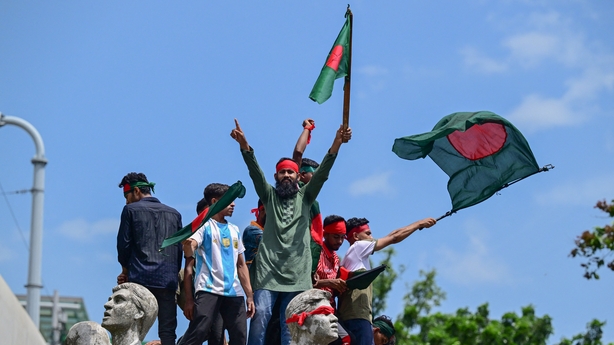At least 91 people were killed and hundreds injured in clashes in Bangladesh as police fired tear gas and rubber bullets to disperse tens of thousands of protesters calling for Prime Minister Sheikh Hasina to resign.
The death toll, which includes at least 13 policemen, was the highest for a single day from any protests in Bangladesh's recent history, surpassing the 67 deaths reported on 19 July when students took to the streets to demand the scrapping of quotas for government jobs.
The interior ministry declared an indefinite nationwide curfew, the first time it has taken such a step during the current protests that began last month.
The unrest, which has prompted the government to shut down internet services, is its biggest test since deadly protests erupted after Hasina won a fourth straight term in January elections that were boycotted by the main opposition Bangladesh Nationalist Party.
Critics of Ms Hasina, along with human rights groups, have accused her government of using excessive force to stamp out the movement, a charge she and her ministers deny.

Demonstrators blocked major highways as student protesters launched a non-cooperation program to press for the government's resignation, and violence spread nationwide.
"Those who are protesting on the streets right now aren't students, but terrorists who are out to destabilise the nation," Hasina said after a national security panel meeting.
"I appeal to our countrymen to suppress these terrorists with a strong hand."
Police stations and ruling party offices were targeted violence rocked the country of 170 million people.
Twelve policemen were beaten to death in the north-western district of Sirajganj, police official Bijoy Bosak said.
At least five people were killed and dozens injured amid fierce clashes in several places in the capital, Dhaka, police and witnesses said.
Two construction workers were killed on their way to work and 30 injured in the central district of Munsiganj, during a three-way clash of protesters, police and ruling party activists, witnesses said.
"They were brought dead to the hospital with bullet wounds, "said Abu Hena Mohammad Jamal, the superintendent of the district hospital.
Clashes
Police said they had not fired any bullets, however, when some improvised explosives were detonated and the area turned into a battleground.
In the northeastern district of Pabna, at least three people were killed and 50 injured during a clash between protesters and activists of Ms Hasina's ruling Awami League, witnesses said.
Two more were killed in violence in the northern district of Bogra, and 20 were killed in nine other districts, hospital officials said.
For the second time during the recent protests, the government shut down high-speed internet services, mobile operators said, while social media platforms Facebook and WhatsApp were not available, even via broadband connections.
The protests paused after the Supreme Court scrapped most quotes, but students returned to the streets in sporadic protests last week, demanding justice for the families of those killed.

